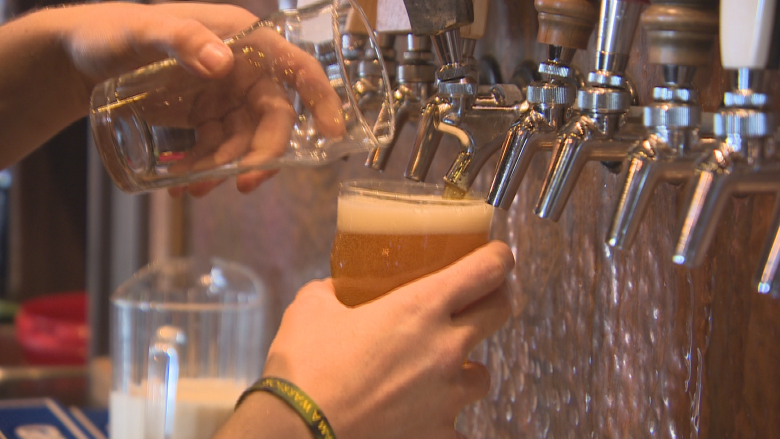Trouble ahead in Canada's beer economy as 'escalator' tax takes hold
If beer commercials are anything to go by in Canada, having a cold one is just as much a staple as watching hockey.
But according to new figures released this week by a brewers' association, Canada's once-booming beer economy is facing growing challenges as consumers down a glass of beer that the industry says is "already half empty."
Beer Canada says almost half of what consumers pay right now for the average price of beer is tax, and as the federal tax on beer increases annually starting next April, consumers will have to pay even more for their suds.
The federal tax on domestic and imported beer rose by two per cent last year as part of the 2017 budget. It will continue to increase every year in line with inflation starting this April.
"The federal tax on beer right now is $31.84 per hectolitre, and it will increase to $32.32 per hectolitre, and this will drive up liquor board markups, PST and GST," said Beer Canada spokesperson Brittany Moorcroft. The scheduled 2018 "escalator" tax amounts to a 1.51 per cent increase.
Beer Canada, which represents the brewers that account for 90 per cent of the beer made in Canada, has launched a campaign this week asking consumers to sign a petition calling on Finance Minister Bill Morneau to scrap the tax increase.
"Imagine being stuck on an escalator going up and up and up, and you cannot get off, and you cannot make it stop — that's what beer lovers in Canada are facing with this escalator tax," said Beer Canada chair George Croft.
The group says tax on beer in Canada is already among the highest in the world.
Canada ranked third of 28 countries for taxing beer in 2012, according the market research firm Impact Databank.
Drinking less
The question of taxes comes at a time when Canadians are already drinking less beer than they used to.
Beer consumption per capita has fallen by 10 per cent over the past decade, according a new study released by the Conference Board of Canada.
A number of factors such as demographic changes, more competition from other alcoholic and non-alcoholic beverages and rising prices have contributed to the decline, the study suggests.
But even with a declining consumer base, the beer industry contributed $13.6 billion to Canada's economy in 2016, the study showed.
"No matter where Canadians buy beer, they support jobs across the country in a wide range of industries, including accommodation and food services, wholesale and retail trade, transportation and agriculture," said Pedro Antunes, economist at the Conference Board of Canada.
The study also found that:
- Beer is still the most popular alcoholic beverage in Canada, making up over 41 per cent of alcohol sales.
- Beer supported nearly 149,000 jobs, generating labour income of about $5.3 billion.
- Almost 85 per cent of beer sales in Canada were from a local brewery.
Revenue generator
For federal, provincial and municipal governments, the beer industry generated $5.7 billion in tax and other revenues in 2016, according to the study.
Defending the move to increase the tax, Finance Ministry spokeswoman Chloe Luciani-Girouard told Reuters that small brewers pay decreased rates on the first 7.5 million litres of beer.
"It's worth remembering that the last effective increase to the federal excise tax was over 30 years ago," she said, adding that the annual inflationary adjustment would provide brewers with greater certainty in the future and is in line with actions taken by many provinces.
Provincial taxes on beer have increased by 58 per cent in Quebec since 2012, 18 per cent in Ontario and 28 per cent in Alberta, according to Beer Canada.
Employment
But Luke Harford, president of Beer Canada, said brewers are telling him that higher taxes will make it harder for them to sell beer and make it less likely for them to invest in their people, plants and community.
"We want to hold on to the big economic footprint that we have in this country, because it employs a lot of people," he said, referring to the market share that local brewers hold over importers.
"There aren't that many food industries that could say that 85 per cent of what is sold in Canada is actually made in Canada. But, because of higher taxation, they [brewers] will have less resources to put toward that," he added.

 Yahoo Finance
Yahoo Finance 

